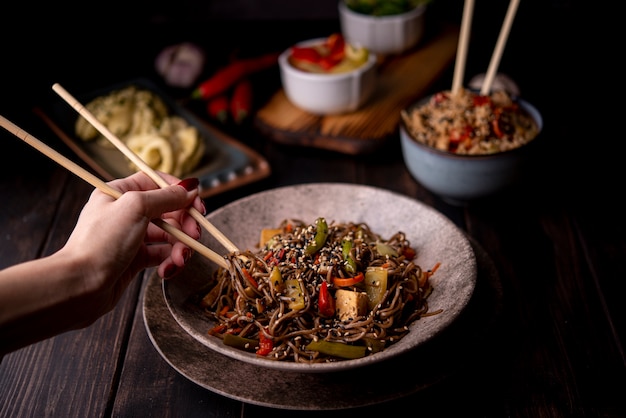
Have you ever tried soba noodles? This Japanese dish isn’t just tasty; it’s also good for you. They look a lot like pasta, but they’re made from buckwheat instead of whole grain wheat.
The main reason soba noodles are healthier than other types of noodles and pasta is because they’re made from buckwheat. Here are some of the health benefits:
First off, even though one serving of soba noodles might not have more protein than whole-grain pasta, the protein quality is better. Your body can use the protein in buckwheat more effectively than the protein in regular wheat. Additionally, buckwheat is high in lysine, an amino acid that’s often lacking in plant proteins like those found in nuts, corn, and wheat.
If you don’t eat animal products, including soba noodles in your diet can give you that extra boost of high-quality protein.
Do you have gluten intolerance or celiac disease? If so, you probably avoid wheat products, which means regular pasta is off the menu for you, and you can’t enjoy other Japanese noodles like Udon noodles.
The great news is that buckwheat is gluten-free. So, you can enjoy soba noodles without worry. Just make sure the brand you buy is 100% buckwheat because some brands mix in a bit of wheat flour.
Manganese is another essential nutrient found in soba noodles. It helps with bone health, reducing the risk of arthritis, diabetes, and osteoporosis. For women, it can even alleviate premenstrual symptoms. A single cup of soba noodles has about 0.4 milligrams of manganese, providing over 18% of the daily recommended amount for both men and women.
Vitamin B1, also known as thiamin, is crucial for energy production and maintaining the health of your nervous and immune systems. A lack of vitamin B1 can increase the risk of heart failure and cataracts. One cup of soba noodles contains about 0.1 milligrams of vitamin B1, which is over 8% of the recommended daily allowance for both men and women.
Prebiotics are another benefit. They help promote the growth of probiotics, which are beneficial bacteria that support digestive health. Buckwheat acts as a prebiotic food, encouraging the growth of probiotics like bifidobacteria. These bacteria aid digestion and can help alleviate constipation, treat H. pylori, and manage irritable bowel syndrome.
Varicose veins, those swollen and twisted veins that often appear on the legs, can be another reason to consider soba noodles. They contain high levels of rutin, a bioflavonoid that strengthens the veins, reducing the appearance of varicose veins and preventing new ones from forming. However, if the veins rupture or cause skin soreness, you should see a doctor.
Ready to enjoy the benefits of buckwheat noodles? Give them a try in your favorite recipe!